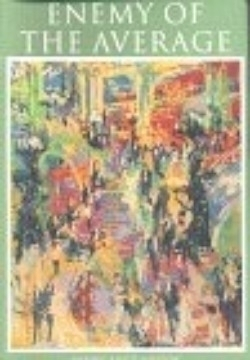Enemy of the Average
If in a fit of silliness Ayn Rand had written a Harlequin romance, the result might have been something like what Margaret Nicol has come up with in Enemy of the Average. There’s much to complain about’silly title, stilted dialogue and repetitive plot?but the novel isn’t entirely joyless. It’s taxing to read but sometimes fun, like an extended comic strip without pictures.
The story begins in the recent past as two undertakers arrive at a rich woman’s mansion to take away her corpse.
The bulk of the novel tells the story of how a peasant girl comes out of pre-World War I Poland and trades her sexual favors for huge wealth. Her one attribute, as the men in the book are forever cooing to her in remarkably unvarying terms, is her great beauty.
She uses her sex appeal to appropriate for herself the fortunes of a Russian baron, a weapons dealer, a doctor, the weapons dealer’s boss and a rich playboy. This gets a tad monotonous for the reader, although the tedium is relieved when she reaches middle age and a couple of fellows succeed in a little quid pro quo.
Aside from greed, our heroine’s other great drive is to win the hand of a fair Russian prince for whom she pines from the time of their first and only date until the revolution strips him of his royal status and leaves him working as a farm hand.
In an effort to win the prince, she becomes an opera diva. Until he trades in the royal life for a pitchfork, he’s an opera buff. Our heroine, unfortunately, can’t sing a lick, a circumstance that causes her a certain embarrassment when she goes on stage in Havana. And Chicago. And Paris. And so on.
At the end of the book, the character dies, wealthy and largely unreconstructed, after an opera career in which her thin voice never made it past the orchestra pit. At the end of this 618-page novel we are to understand there is much to be admired about effort and perseverance and a flair for the dramatic even if great art is not achieved.
Reviewed by
Rich Wertz
Disclosure: This article is not an endorsement, but a review. The publisher of this book provided free copies of the book to have their book reviewed by a professional reviewer. No fee was paid by the publisher for this review. Foreword Reviews only recommends books that we love. Foreword Magazine, Inc. is disclosing this in accordance with the Federal Trade Commission’s 16 CFR, Part 255.

